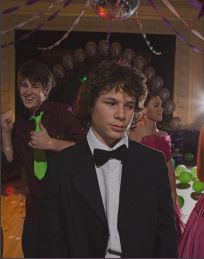 Spring is in the air- and, in our office, prom is the buzz. Our teenagers are eager to get a date. Once they feel comfortable with their social thinking therapists, our boys want to know how to ask a girl on a date.
Spring is in the air- and, in our office, prom is the buzz. Our teenagers are eager to get a date. Once they feel comfortable with their social thinking therapists, our boys want to know how to ask a girl on a date.
So: How DO You Ask Someone on a Date?
You hang out in a predetermined location, wait for her to arrive and then ask questions to find out more about her. It’s all about reading social cues, thinking about others, asking questions about them, and looking interested in their answers (even if you’re not). We call this the social fake. Some of our teenagers are disastrous at this, and Evan was one of those kids.
When we first met Evan, he typically entered a room with his shoulders hunched and his eyes downcast, so he wouldn’t have to make eye contact with anyone. When our eyes landed on the crown of his head, we said, “Hi, Evan”, to which he grumpily responded, “Hi”. We followed that greeting with a friendly, “How are you doing today?”. He averted his eyes and whispered “fine”.
Being the social-thinking specialists that we are, we persevered, “How’s school going?”. Again, under his breath, Evan repeated “fine”… end of conversation as far as Evan was concerned!
Making matters worse, when we did attempt to transition the conversation to ourselves, Evan’s responses were often sarcastic and offensive (unbeknownst to him), which deflated rather than continued the conversation.
Evan Only Knew How to Talk about Himself!
It’s a common problem, and not just amongst teenagers! Maybe you know people like this. They can answer your questions and talk endlessly about themselves. But they don’t reciprocate. They don’t show interest in hearing about you.
The problem for Evan and most of these individuals is a lack of awareness about the rules.
What ARE the Rules for Conversation?
Speaker 1 initiates a greeting.
Speaker 2 greets back.
Speaker 1 asks how her conversational partner is doing.
Speaker 2 responds and asks back.
Speaker 1 remembers something about Speaker 2’s life and initiates a conversation about that.
Speaker 2 answers the question.
Speaker 1 gives a supportive comment like “Cool!”, “Nice!” or “Oh no!” and thinks of a follow-up question to keeps Speaker 2 talking.
Then, Speaker 2 transitions the conversation to Speaker 1!
And the conversational flow goes on and on. It’s a two-way street. If you can’t play both roles, you’re a loser at conversation!
You have to be a Conversationalist to Get a Date!
Evan was driven to succeed. We started with his posture – pull your shoulders back, look up and greet people as you enter the room. Say “hi” to anyone with whom you make eye contact. Assess the situation, find a friendly face and ask how that person is doing. If that person still looks interested in the conversation with receptive facial expressions and body language, find out about her weekend or just comment on the weather. Make an appropriate supportive comment depending on her response. Make sure your comment is either sincere or gently kidding accompanied by a smile. Then ask a follow-up question to keep her talking.
Eventually, if she still looks interested in this conversation, you can segue to a similar topic about you. If she knows the rules and has the interest, she will show the same conversational courtesies toward you.
Evan has learned to play this conversational game. He is practicing on friends at school, especially girls. He has a weekly homework assignment to say “Hi” to at least one girl, learn her name, remember it, and start conversations with her.
Evan is Planning to Ask a Young Lady to the Prom.
He has even started taking dance lessons, because he knows that boys who can dance are chick magnets.
We think that young lady will accept, because Evan is a cool kid. It’s not because he gets straight A’s. That won’t get him a date. It’s because he’s kind, shows interest in other people and has a funny sense of humor. And Evan knows the art of conversation.
If you know someone, child or adult, who needs help with social interaction, call us at 858.509.1131 or contact us via our form.
It is never too early or too late to begin! We run social thinking groups for all ages.